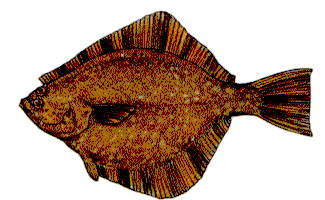Starry Flounder


| Name: Starry Flounder |
| Scientific name: Platichthys stellatus |
| Range: West coast from Northern California to Alaska |
| Habitat: shallow sandy coastal bottoms |
| Status: not threatened |
| Diet in the wild: Small starry flounders eat mostly crustaceans. Larger ones eat crabs, clams and sand dollars. They sometimes also eat other fish such as sardines and sanddabs |
| Diet in the zoo: Mostly shrimp, squid and small fish. |
| Location: Aquarium |
| Physical Description: The body of the Starry Flounder is broad, diamond-shapped and relatively short. The head is also short with small eyes and mouth. The Starry Flounders are dark brown with a lightly colored underside. The flounder's coloring makes it easy to camouflage themselves. |
| General Information: The Starry Flounders are found in the Pacific Ocean from San Francisco, California to Arctic Alaska. They can also be found in the Sea of Japan. Although they are primarily a saltwater fish, some have been found in freshwater. Starry Flounders are also part of the right eyed flounder families; however the majority of Starry Flounders are left eyed. All flounders, including the Starry Flounders undergo metamorphosis in which the larva is changed into a very small flounder-shaped fish. What makes this metamorphosis process most interesting is the migration of one of the eyes from one side of the body to the other. Eventually, both eyes end up on the dorsal side of the fish. |
| Special anatomical, physiological or behavioral adaptations: All Starry Flounders have pigment cells that allow them to alter their coloring to suit their bottom dwelling life styles. This makes them "invisible" to both predator and prey along with burrowing into the sand and mud. The up and down (lateral) motion of the tail provides several advantages for the Starry Flounder. One of those advantages is that it enables the fish to throw sand up over it to cover its body. This also helps further camouflage the Starry Flounder. |
| Comments about the Starry Flounder at the Fort Worth Zoo: The Starry Flounder at The Fort Worth Zoo comes from the waters of the Pacific Ocean. The Starry Flounder is approximately 18-20 inches long. It stays mostly hidden on the bottom floor of the aquarium. |
| Personal Observations:The Starry Flounder at the Fort Worth Zoo is pretty shy. It stays mostly hidden, so we nicknamed him "Ghosty." He hides under the sand and sometimes behind the aquatic vegetation. If you can, try to watch this fish during feeding time; it is truly an amazing sight. |
| Source Materials and
Related Links: Grzimek's Animal Life Encyclopedia. Volume 5. Fishes II, Amphibians. 1974. pg 226-228 |
Click here
to email
Carolyn

Click here to
email Rick
